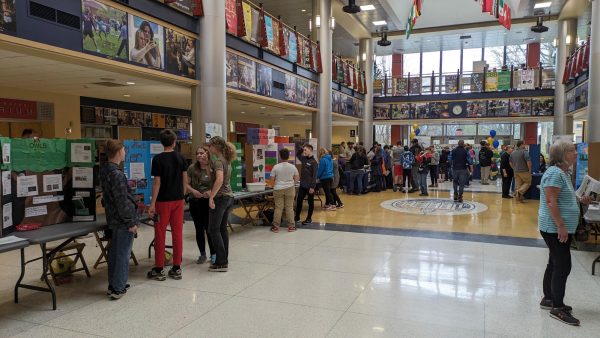Reflection, vigilance one year after COVID-19 declared a pandemic
March marks the one year anniversary of the World Health Organization declaring COVID-19 a global pandemic, and the college announcing an extended spring break.
The college experience has significantly changed since March 2020 in order to comply with public health guidelines. Online and hybrid classes are the new norm, both Brooks Dining Hall and McKinley’s have limited occupancy, COVID testing is required and large social gatherings are prohibited.
Even if vaccines improve the current situation, many are wondering when a sense of normalcy will be restored.
“We’re going to be talking about 2020 for a long time,” said Epidemiologist and Professor of Global Health and Biology Becky Dawson. “March 6, 2020, was when the first cases in Pennsylvania were diagnosed, and that was the moment of pause and looking around thinking we are all about to live through this.”
When President Hilary Link sent out an email informing the Gator community of the extended spring break on March 11, 2020, relief and uncertainty were common feelings among the student body. Some in the community were eager to spend more time with family and friends, whereas others doubted the college’s intended goal of in-person classes resuming on March 30.
Shortly after most students returned home, the college—consistent with other educational institutions—announced that the remainder of the spring 2020 semester would be remote.
The transition to remote learning last spring, whether delivered through Zoom or Google Meet, generated numerous challenges for students, instructors and administrators.
“In the beginning it was really weird,” said Margot Joyce, ’22, a biology major and psychology minor. “I was doing classes to go through the motions and finish the semester because I wanted it over and the transition to online was difficult.”
Educators also faced similar challenges adapting to remote learning and finding innovative ways to teach students.
“It was a challenge trying to be creative,” Professor of English Jennifer Hellwarth said. “However, I was able to learn new pedagogical approaches and ways of building community that I think will be helpful when we’re all back in the class again and not hybrid and six feet apart with our faces covered.”
At the end of the spring 2020 semester, academic administrators surveyed both students and instructors in order to gather common concerns and issues in preparation for online and hybrid classes in the fall.
According to Provost and Dean of the College Ron Cole, the feedback from this survey created three fundamentally important goals for learning: a learning environment, access to technology and personalized education. Cole is the chief academic officer who works with President Link and faculty to shape and manage the college’s academic program.
Cole applauded the resilience displayed by instructors to achieve the three fundamental goals.
“The Allegheny faculty have quickly adapted and remain deeply committed to delivering their courses and mentoring students through the challenges of the pandemic,” Cole said.
The Library and Information Technology Services has also played a vital role in providing access to technology, but also for leading the transition from Sakai to Canvas in preparing for the fall semester.
“Our LITS has done monumental work to bring this campus forward,” Cole said.
When students returned in the fall semester, the college experience looked drastically different from years prior. Some major differences included periodic PCR or rapid tests, on-campus quarantines barring travel into Meadville, eating meals from Brooks or McKinley’s outside or in dorm rooms and online meetings for extracurricular activities.
As vaccination rates ramp up throughout the United States, questions about easing some restrictions and returning to a “normal” college life have grown on campus.
“Nationally we’re starting to see really small pullbacks that are guided by science and for people who have been fully vaccinated,” Dawson said. “The big just ‘open it back up’ will come back to bite us.”
Joyce was also reluctant to advocate for an immediate return to normalcy.
“It’s premature to lift something like a mask mandate because it’s very easy to still transmit (COVID-19) and that has the potential to overwhelm health care systems again,” Joyce said. “I do still maintain hope that things can get back to what they used to be because we’re human beings and it’s important for us to be around each other.”
Dawson urged students to continue following COVID-19 protocols and getting vaccinated to help speed up a future return to normality.
“It’s essential to do the things we’ve been doing even though it feels like it’s been going on forever,” Dawson said. “Masking, distancing, washing hands, and making up your mind with that vaccine once your turn is called is all critical.”
Even as vaccines may help return life to a sense of normality in the near future, the long-term health effects of COVID-19 may continue to affect individual students’ lives.
“I still suffer from extreme fatigue, which is different than when I’m really tired,” said Hellwarth, who tested positive for COVID-19 in November 2020. “Shortness of breath is also present, so even folding laundry can sometimes be difficult.”
On the other hand, some Gators have made full recoveries and don’t report any long-term physical effects.
“For me I had a mild case, which I’m fortunate of,” said Joyce, who contracted COVID-19 in early February. “I’ve been able to assume regular activities, and I don’t have any lingering effects like trouble breathing or loss of taste.”
Beyond COVID-19’s impact on physical health, mental health has also affected students and faculty due to prolonged isolation and the loss of loved ones throughout the pandemic.
“All of us have been through something traumatic,” Dawson said. “I think we need to address that and not stigmatize it. Mental health is a real issue and (COVID-19) has really brought that to light.”
Joyce also recognized COVID-19’s impacts on mental health.
“There’s a lot of fear built around the virus and I think it’s really debilitating for people in terms of mental health,” Joyce said. “You can go about living your life, you can go to the grocery store, but as long as you’re careful. Hanging out with your friends outside and being outdoors also has a lot of benefits.”
According to Cole, the campus community is weary across the board, but encouraged Gators to keep the faith.
“We will be stronger on the other side of this adversity,” Cole said.
The long-term impacts of COVID-19, from physical and mental health to health care and college planning, will likely be present even after every individual has access to a vaccine.
“There’s this theory in history called the silver lining theory, and in that it states that out of terrible things we eventually see good things,” Hellwarth said.






